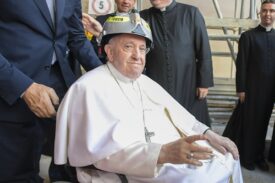By Elise Ann Allen
ROME (Crux) — To the delight of many, and perhaps the consternation of a few, the wheelchair-bound Pope Francis defied persistent rumors Sunday by not announcing his resignation during a visit to the tomb of the last pontiff to voluntarily step down before Pope Benedict XVI, instead offering locals a message of mercy and consolation amid suffering.
L’Aquila, the capital of the central Italian region of Abruzzo and the final resting place of Pope Celestine V in the 13th century, was the site of a severe earthquake that practically leveled the city in 2009, leaving around 300 people dead and roughly 1,500 others injured.
Pope Celestine V led the Catholic Church for just five months, from July 5, 1294, until his resignation on December 13.

Pope Benedict XVI visited L’Aquila after the 2009 earthquake, leaving behind the pallium, or stole, which he’d received at his election, which observers later came to see as a foreshadowing of his own resignation four years later.
That gesture fueled rumors that Pope Francis, who is facing several health challenges and who has expressed a willingness to resign if he feels incapable of fulfilling the demands of his office, would potentially announce his own resignation Sunday.
(Others speculated that Pope Francis might wait until his meetings with cardinals Monday and Tuesday to deliver the news, although he’s used several recent interviews to deny emphatically that he’s presently considering stepping aside, insisting that “it never entered my mind.”)
During his brief sojourn in L’Aquila, the pope extended a message of faith and hope to citizens who continue to rebuild after the deadly quake destroyed so much of their city.
After his arrival, Pope Francis, who used a wheelchair throughout his visit due to ongoing osteoarthritis of the knee, offered a brief greeting to the family members of victims of the earthquake, assuring them of his closeness and thanking them for their “witness of faith.”
“Even in pain and bewilderment, which belong to our faith as pilgrims, you have fixed your gaze on Christ, crucified and risen, who with his love redeemed pain and death from a void of meaning.”
“Jesus has placed you back in the arms of the father, who does not let a tear fall in vain, not even one, but gathers them in his merciful heart,” the pope said, adding that on God’s heart are written “the names of your loved ones, who have passed from time to eternity.”
“Communion with them is more alive than ever,” he said, adding, “death cannot break love.”
He also gave a special mention to prisoners, several of whom were present, saying they too are a sign of hope, “because even in prisons there are many, too many victims. Here today, you are a sign of hope in human and social reconstruction.”
Pope Francis then celebrated Mass for the so-called “Celestine Pardon,” which is celebrated annually from Aug. 28-29 and which has at its heart the granting of a plenary indulgence to everyone who visits the local basilica, goes to confession, receives Communion, and prays for the intentions of the pope.
Pope Celestine established the celebration during his brief papacy in 1294, declaring, at a time when indulgences were being sold for money or some other consideration, that only two conditions were necessary to receive forgiveness: Entering the basilica between Aug. 28-29 every year, and being “truly sorry and confessed.”
In his homily, Pope Francis remembered his 13th-century predecessor as “the man of the ‘yes,’” and a “courageous witness of the Gospel” and of humility.
Humility, the pope said, “does not consist in the devaluation of oneself, but in that healthy realism that makes us recognize our potential and also our miseries. Starting precisely from our miseries, humility makes us look away from ourselves in order to turn to God.”
Pope Celestine V, he said, was courageous because “no logic of power could imprison or manage him,” and because of this, his example can be admired as “a Church that is free from worldly logic and fully witness to that name of God which is mercy.”
One of Pope Celestine’s greatest legacies, Pope Francis said, is that “with mercy, and only with this, can the life of every man and every woman be lived with joy.”
Mercy, he said, is the experience of feeling “welcomed, put back on our feet, strengthened, healed, and encouraged.
He prayed that the basilica, which is still undergoing restorations, would forever be a place of reconciliation and a place where “God puts us back on our feet and gives us another chance. May it be a temple of forgiveness, not only once a year, but always.”
Pointing to the suffering experienced by those who lost homes and loved ones, the Pope told locals that those who suffered must be able “to make a treasure of your own suffering,” and must understand that “in the darkness experienced, the gift has also been given of understanding the pain of others.”
When someone is experiencing an “earthquake of the soul,” he said, they can lose everything but still learn “true humility.”
Pope Francis closed his homily praying that L’Aquila would be the capital of “forgiveness, peace, and reconciliation,” and that it would become an example of the humility spoken of in the Gospels.
After Mass, the pope led locals in the traditional Marian Angelus prayer.
Before returning to Rome, he gave a special greeting to all those who participated in the events of his visit, either in person or remotely, and thanked local civil and ecclesial authorities for their assistance.
He also offered a prayer for the people of Pakistan who have been impacted by recent flooding and for all those suffering from war, specifically those in Ukraine.
Pope Francis asked God to “revive in the hearts of the leaders of the nations the human and Christian sense of piety and of mercy.”
